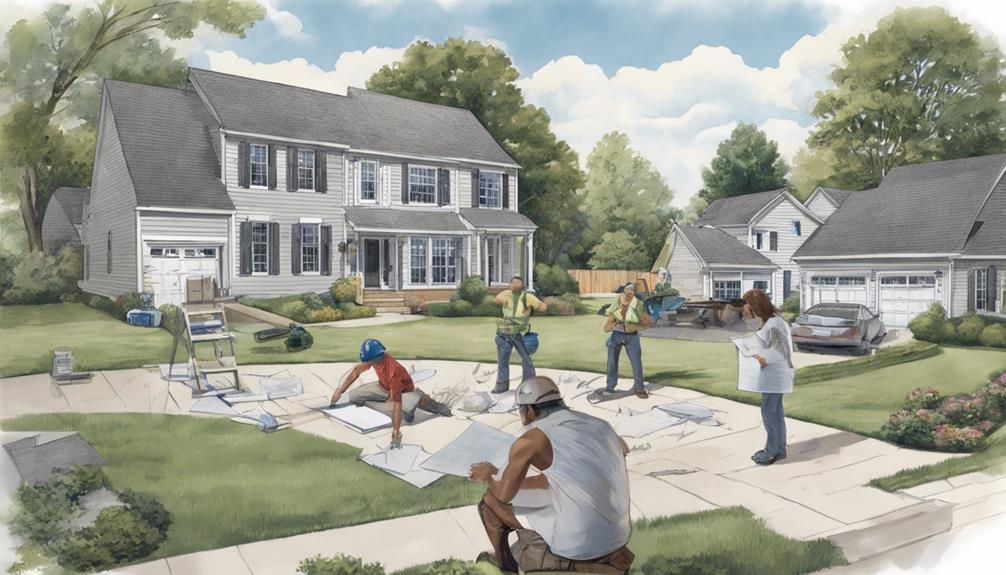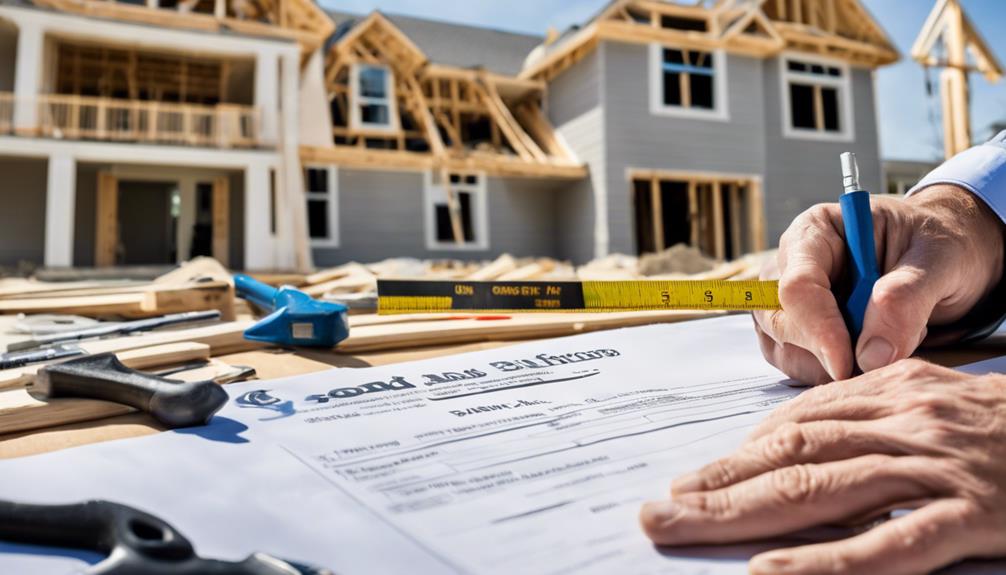If you're considering hiring a home improvement contractor in Fairfax County, VA, you might want to understand the significance of the Home Improvement Contractor Bond. This bond isn't just a formality; it plays a crucial role in protecting your investment and ensuring that contractors adhere to local regulations. It's set at $50,000, but what does that really mean for you as a homeowner? The implications of this bond could impact your project more than you realize, and exploring its details might just save you from potential pitfalls.
What Is a Contractor Bond?

A contractor bond is an essential tool in the home improvement industry that protects both homeowners and contractors. This type of bond serves as a written agreement, ensuring that a contractor adheres to local laws, regulations, and industry standards.
When you hire a contractor who's bonded, you're essentially gaining peace of mind. Should any issues arise, such as unfinished work or failure to meet contractual obligations, you've got a safety net in place. These bonds promote accountability and fair practices within the industry, ensuring that contractors fulfill their commitments and comply with relevant regulations, much like auto dealer bonds do in the automotive sector.
The bond acts like an insurance policy for you, the homeowner. If the contractor doesn't fulfill their duties, you can file a claim against the bond to recover your losses. This process incentivizes contractors to deliver quality work and maintain a good reputation.
For contractors, securing a bond can enhance credibility and trustworthiness in the eyes of potential clients. It demonstrates a commitment to professionalism and accountability.
In many jurisdictions, obtaining a contractor bond is a legal requirement, making it an essential aspect of running a legitimate home improvement business. Whether you're a homeowner looking to renovate or a contractor seeking projects, understanding contractor bonds is crucial for a successful partnership.
Importance of Home Improvement Bonds
Home improvement bonds play a crucial role in ensuring that both homeowners and contractors are protected throughout a project. These bonds act as a safety net, offering peace of mind for everyone involved. When you hire a contractor, you want to know they're trustworthy and capable; with a bond in place, you can feel more secure about your investment.
Additionally, Illinois Surety Bonds are vital for enhancing the credibility of contractors and ensuring compliance with state regulations.
If a contractor fails to meet the agreed-upon terms or doesn't complete the work satisfactorily, you can file a claim against the bond. This process helps you recover some or all of your financial losses, making it easier to find a replacement contractor or complete the project.
On the other hand, contractors benefit too, as having a bond can enhance their credibility and demonstrate their professionalism to potential clients.
Moreover, these bonds encourage contractors to adhere to local laws and regulations, ensuring compliance and quality work.
Requirements in Fairfax County

In Fairfax County, understanding the specific requirements for home improvement contractor bonds is essential for both homeowners and contractors. To operate legally, contractors must obtain a bond that serves as a financial guarantee for the work performed.
Generally, the bond amount is set at $50,000, but this can vary based on the scope of work and other factors. Additionally, bonds, much like those required for Louisiana Movement of Vehicles, ensure compliance with local regulations and protect consumers from financial loss. You'll need to provide proof of liability insurance and a business license, ensuring that you meet the county's standards for safety and professionalism.
Additionally, contractors should submit a completed application to the Department of Planning and Zoning, along with the required bond documents. It's crucial to choose a surety company that's licensed in Virginia to issue your bond.
Once your bond is in place, keep it updated and maintain compliance with all local regulations. Remember, failing to meet these requirements can lead to fines and the inability to operate legally in Fairfax County.
How to Verify a Bond
To verify a home improvement contractor bond, start by checking with the surety company that issued the bond. You can often find this information on the bond itself, as it typically includes the surety company's name and contact details.
Reach out to them directly, either by phone or email, and provide the contractor's name and bond number.
Next, ask the surety company to confirm the bond's validity. They should be able to provide you with information about the bond's status, the coverage amount, and the terms.
Make sure the bond is current and hasn't expired.
Additionally, you can check with your local licensing authority or the state's Department of Professional and Occupational Regulation. These agencies often maintain records of licensed contractors and their bonding status.
Benefits for Homeowners

Understanding the bond verification process not only protects you but also highlights the benefits of having a bonded home improvement contractor. When you hire a bonded contractor, you gain peace of mind knowing that they're required to adhere to specific industry standards and regulations. This ensures that they're qualified and reliable, reducing the risk of subpar work.
A bonded contractor also provides you with financial protection. If the contractor fails to fulfill their obligations or causes damage, you can file a claim against the bond for compensation. This safety net makes it less likely that you'll face significant financial losses due to construction mishaps or incomplete projects.
Moreover, working with a bonded contractor often means you're dealing with someone who values their reputation. They're motivated to provide high-quality service to avoid claims against their bond, which can tarnish their standing in the community.
Lastly, many bonding companies conduct thorough background checks on contractors. This extra layer of scrutiny can help you feel more confident about your hiring decision, knowing that you're choosing a vetted professional for your home improvements.
Common Bonding Issues
While hiring a bonded contractor can offer many advantages, there are common bonding issues you should be aware of. One prevalent issue is the contractor's inability to secure a bond due to poor credit history or lack of experience. This could limit your options, as not all contractors may qualify for bonding, impacting your project's timeline.
Another issue is the potential for bond claims. If a contractor fails to fulfill their obligations, you might file a claim against their bond for compensation. However, this process can be time-consuming and complex, leaving you frustrated and potentially without the funds you need.
Additionally, some contractors may misrepresent their bonding status. Always verify a contractor's bonding information with the surety company to avoid surprises. You should also keep in mind that a bond doesn't guarantee satisfactory work; it merely serves as a safety net.
Lastly, watch for any discrepancies in the bond amount. If the bond is insufficient to cover your project's total cost, you might end up facing financial challenges. Being aware of these common bonding issues can help you make informed decisions and protect your investment.
Steps to Obtain a Bond

Securing a home improvement contractor bond involves a few straightforward steps that you can follow.
First, determine the specific bond amount required in Fairfax County, as this can vary depending on the scope of your work. Once you know the amount, you'll need to gather necessary documentation, which typically includes your business license, financial statements, and proof of insurance.
Next, shop around for a surety company that specializes in contractor bonds. Reach out to multiple providers to get quotes and understand their requirements.
After selecting a surety company, complete their bond application. This may involve providing personal financial information, business history, and any relevant experience in the home improvement field.
Once your application is submitted, the surety company will review it and assess your qualifications. If approved, you'll pay the premium, which is generally a percentage of the bond amount.
Resources for Homeowners
After obtaining your home improvement contractor bond, it's important to know what resources are available to you as a homeowner. One of the most valuable resources is the Virginia Department of Professional and Occupational Regulation (DPOR). They offer information about licensed contractors, helping you verify their credentials before hiring.
You can also check out local consumer protection agencies. They provide insights into your rights and responsibilities as a homeowner and can assist with complaints against contractors.
Online platforms like the Better Business Bureau (BBB) can help you read reviews and ratings of contractors in your area.
Networking with neighbors or local community groups can yield personal recommendations, which can be invaluable.
Don't forget social media—many communities have groups where you can ask for contractor referrals.
Conclusion
In summary, obtaining a Home Improvement Contractor Bond in Fairfax County is essential for both contractors and homeowners. It not only ensures compliance with local laws but also provides financial protection against potential issues. By understanding the bonding process and its importance, you can make informed decisions when hiring a contractor. Remember, a bonded contractor enhances your peace of mind, so don't hesitate to verify their bond before starting any home improvement project.

